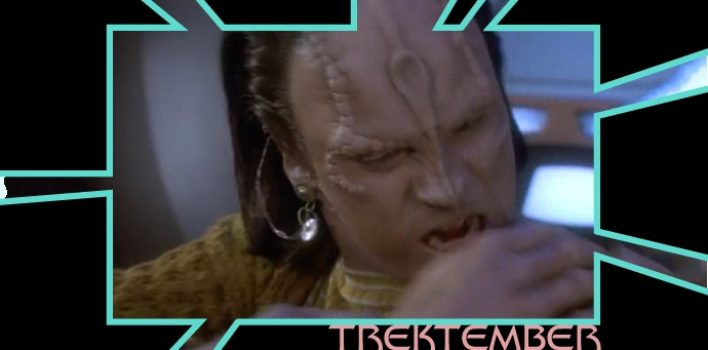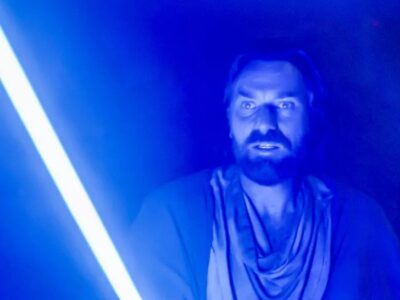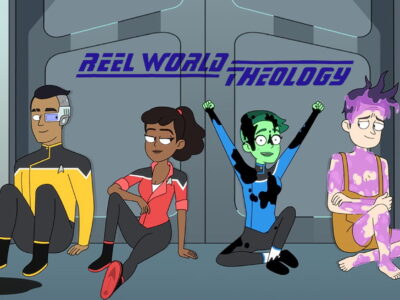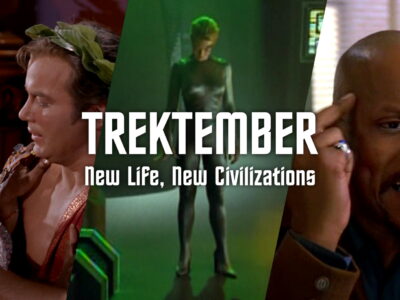Trektember: Cardassians
Really good and lasting sci-fi is, at its core, about people.
Now, those people might have green skin, ears the size of dinner plates, or spoon-shaped indentations on their foreheads, but good sci-fi puts people into big and important situations that reflect our hopes, dreams, fears, values, and biases, to provoke thought and emotion in both the character and the viewer.
Is Star Trek good sci-fi? I think so. And you’re reading this, so you probably agree, at least a little bit. But even if you don’t, it’s tough to deny that it’s about people. And in Deep Space Nine, it doesn’t give those people an easy life.
Season two’s “Cardassians” is a good example of the show not letting its characters off the hook. Sisko and Bashir are not given a simple task in deciding war orphan Rugal’s fate: they have to fight for every fact, plead for every principle. The question is definitely a big and important one: what is the worth of a person? From the beginning, there are very clear battle lines drawn.
Dukat
A Person’s Worth is Based On What They Can Do for Me
Despite all of Dukat’s crocodile tears over restoring war orphans to Cardassia and the duty of Cardassians to the children they left behind, the episode makes it clear that this is all a con. He speaks Rugal’s name only once, appealing for the rest of the episode to a nebulous and indefinite entity called “the children;” though he only ever mentions them as a problem or a sad reality, never as people. To him, they may as well be a space monster, or a meteorological phenomenon. It’s clear that they are a tool in his hands, not an issue about which he cares. None of the characters believe his bluster (least of all Garak); and when his plan is no longer politically expedient, he abandons it.
Few people would disagree that Dukat’s use of Rugal for his own benefit is evil, or at the very least quite unsavory. He doesn’t place any value on a person beyond what they can do for him, and even those who are valuable now may not hold value for him later.
We look down on Dukat for this devaluing of people (and rightly so), but many of us have a tendency to act the same way, if to a lesser degree: we disregard those who have wronged us or people who need something from us. We help because it will make us look good. We treat love as a tool to manipulate another. We lie and cheat to get what we want at the expense of others. We prove that, to us, a person’s worth is based on what they can do for me.
It’s a mean way to live, and a horrible way to care for another.
Proka
A Person’s Worth is Diminished by Who They Are
Rugal’s adoptive Bajoran father is kind to the boy, and on the face of it even a good father. He took in the child of his most hated enemy because the child needed him, which is obviously a virtuous act. In fact, for the longest time, I hated this episode because of the decision that Sisko makes in the end. But in my rewatch for writing this article, one of Proka Migdal’s lines to Commander Sisko stuck in my mind.
Sisko: The Cardassians are suggesting that the Bajorans are raising these orphans to hate their own people.
Proka: To hate Cardassians? It shouldn’t be too hard, should it? We told him the truth, Commander. The truth about what Cardassia did to Bajor. He needed to know, and for that I make no apologies. To us, he isn’t even one of them anymore. He isn’t Cardassian, he’s Bajoran. And we love him just as if he were our own flesh and blood.
This blew right by me the first several times, but the truth of it finally hit me: Proka doesn’t mince words when talking about the people who enslaved and persecuted his people. And fair enough; the atrocities committed by the Cardassian military were horrible. But what Proka is telling Sisko in this statement is essentially, “Rugal is one of the few good ones.” And in order to be considered such, he has to turn his back on who he is; to become someone other than what he was created to be. He can’t be Cardassian and find love or belonging on Bajor; he has to become Bajoran to be truly accepted, even by his adoptive father. And Rugal confirms the efficacy of this campaign of self-hatred, telling Chief O’Brien, “I wish I wasn’t Cardassian.” Proka may not be teaching or thinking this way consciously, but Rugal has definitely picked it up nonetheless.
We see this sort of stereotyping happening in our culture, too; systemic racism that presumes the default to be white, simply because no one has thought about the problems facing other ethnic groups. Having discussions about diversity and policy without including people who are from the groups which will be affected. White people being told (or telling themselves) that they are evil because they are beneficiaries of a system that has lifted them up over people of color, rather than actually pursuing ways to level that playing field. Passionate cries to “send back” people who are already in the country they’re from, simply because they look different. Over and over, we see that people who are different are treated as bad; and only by changing or running from their ethnicity can they really be valuable or accepted.
Sadly, when you’re raised to believe that you’re evil and that your only value comes out of how far away from your skin color you can run, you won’t think of yourself as holding inherent value and worth. When others in the culture see you that same way, they won’t think of you as holding inherent value and worth, either. Day after day, we hear people insisting through words and acts that a person’s worth is diminished by who they are.
So sometimes, we’ll pursue real worth and value by pouring it into others.
Pa’Dar
A Person’s Worth is in Who They Are To Me
Of all the non-humans involved in this discussion, Kotan Pa’Dar is probably the closest to feeling right. His desire to be reunited with Rugal is surprising in its earnestness, considering how Cardassians have been portrayed in Deep Space Nine up to this point. He’s filled with anticipation during his chat with O’Brien before the reunification; and seeks to connect with the boy even though he’s hostile to Pa’Dar from nearly the first moment he sees him. The man is even willing to throw away his entire political career for Rugal’s sake.
This heedless love could be seen as a reflection of the Biblical story of the Prodigal Son: the father who runs out to meet his long-lost son, recklessly and unceremoniously embracing him before he even arrives back at the house. Of course his son is valuable! So valuable that he would give the boy anything and everything he needed regardless of how long he’s been gone, the sins he committed, or the disdain he showed for his father. Even a child’s hatred cannot stop a father’s love.
Yet, despite Pa’Dar’s love for his son, he didn’t care about the boy until the genetic test uncovered who he was. The other war orphans are similarly irrelevant to him; when Sisko suggests that Pa’Dar use his newly-secure political weight to do something about the orphans, he practically ignores the suggestion. They’re not his responsibility. They don’t have value or worth to him, because they aren’t his son. In his dismissive “we’ll see” is the reality that, to him, “a person’s worth is only in who they are to me.”
But Sisko’s interest in Rugal isn’t political. In fact, it goes all the way back to something Jesus said in the book of Luke, over 23 centuries before the events of this episode.
Sisko
A Person’s Worth is Inherent to their Being
Commander Sisko’s decision to investigate and arbitrate the dispute between Pa’Dar and Proka can be taken back to his responsibility as mandated by the Federation Charter:
We the lifeforms of the United Federation of Planets, [being] determined to save succeeding generations from the scourge of war, and to reaffirm faith in the fundamental rights of sentient beings, in the dignity and worth of all lifeforms…
—Federation Charter, as seen in Star Trek: Voyager, s7e15: “The Void”
The Federation Charter was composed largely by updating the words of the United Nations charter, which took heavy inspiration from many covenants and constitutions around the world; many of which take inspiration come from the words of Jesus in the book of Luke:
Are not five sparrows sold for two pennies? And not one of them is forgotten before God. Why, even the hairs of your head are all numbered. Fear not; you are of more value than many sparrows.
—Luke 12:6-7, ESV
Jesus is the best example of truly valuing the inherent worth of people. He even came to die for those He valued. But it didn’t start with Jesus’ words in Luke, either. No, it began with God creating people, all the way back in Genesis.
So God created man in his own image,
in the image of God he created him;
male and female he created them.
—Genesis 1:27, ESV
Our true Father’s imbuement of worth into humanity is inviolable and irrevocable. He made us with inherent value, with part of Himself in us, and insisted that we treat one another as such.
And so, when Sisko decides that Rugal is to go with his biological father back to Cardassia, he’s siding with the inherent value of Rugal. He does have worth, Sisko is saying; not simply because of what he can do for others, or because of what he is or isn’t, or because of who he knows or is loved by, but because of his very life.
Contrary to Garak’s insistence, there is truth. In this episode, that truth is that Rugal has value just for being alive. And so do you.








Pingback: Trektember: Season 4 Episode List | Reel World Theology